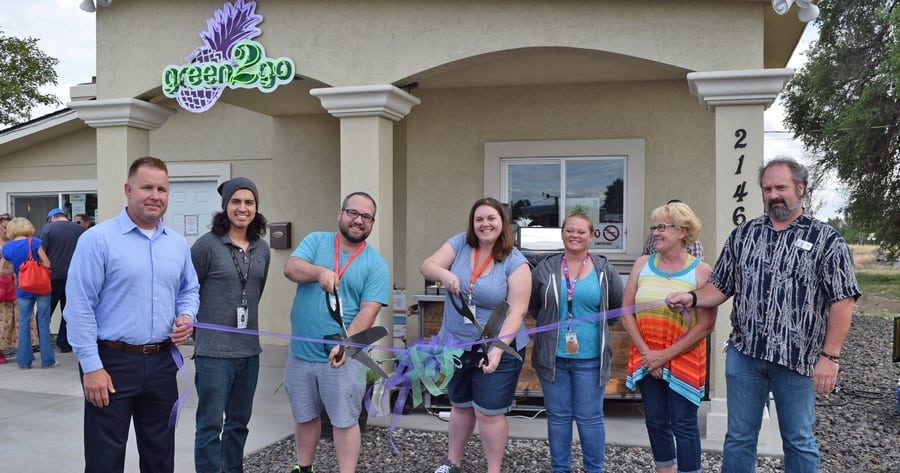
Home » State Legislature may tackle topics affecting Tri-City region
State Legislature may tackle topics affecting Tri-City region

December 15, 2016
Retail pot, small modular reactors, funding for college projects among items of local interest
Local governments in Benton and Franklin counties could find their bans and moratoriums on selling retail marijuana revoked in 2017.
There’s also a chance that building small modular reactors in the Tri-Cities could get another chance in the Washington Legislature.
Budget watchers could end up looking for money for a new culinary institute in Kennewick and a new academic building at Washington State University’s Tri-Cities campus.
These are a few of the items Tri-Citians may want to keep an eye out for when the state Legislature begins its 2017 session Jan. 9 in Olympia.
More retail pot in region?
Benton County has a moratorium on allowing new retail pot dealers beyond the four currently allotted by the state. That includes one in Finley and three in Prosser. Franklin County, Pasco, Kennewick, Richland and West Richland have outright bans on growing, processing and selling marijuana.
On Dec. 6, the Benton City City Council voted 3-2 to allow marijuana retailers, growers and processors to operate — under specific zoning requirements — within city limits starting May 1.
Legislation to end local government bans on selling retail marijuana likely will show up in the 2017 session, possibly in an omnibus bill containing all the latest tweaks to the state’s fledgling system for controlling legal marijuana, said Rep. Cary Condotta, R-Wenatchee, and one of the House leaders on those adjustments.
Such a bill likely would still allow city and county governments to continue to ban marijuana growers and processors, but not retailers.
Removing local power to ban retailers is part of the Legislature’s efforts to make the legal marijuana competitive with the black market, Condotta said. Another likely piece of legislation would be reducing the excise tax on retail marijuana from 37 percent to 25 percent, he said.
“We believe more sales will offset (the lower tax rate),” Condotta said.
Last June, Steve and Jessica Lee expanded their medical marijuana shop in Finley to include selling recreational pot.
Steve Lee supports the state allotting more marijuana licenses in the Tri-City area and removing local governments’ power to ban them.
More local marijuana shops cut into black market pot dealers’ business, he said. “The black market is dangerous. That was a primary consideration of Initiative 502 (which legalized recreational marijuana in 2012),” Steve Lee said.
Lee said while any business does not like paying taxes, he supports the state levying some taxes on marijuana operations. Paying taxes makes a marijuana business a legitimate member and financial contributor to a community, he said.
More conservative community members understand and accept the idea of a taxpaying business contributing to the good of a town or county, he said.
“We love paying taxes. … We pay for being allowed to be in a community,” Lee said.
Statewide, the retail price of marijuana has dropped dramatically. In 2014, the average retail price was $21.23 per gram. Today, it averages $8.61 per gram, according to Washington Liquor & Cannabis Board figures.
The current figure appears close to the black market’s prices, which is roughly $6 per gram, said Rep. Chris Hurst, D-Enumclaw, who has been Condotta’s counterpart on the House marijuana regulation. Hurst retires from the Legislature at the end of this year.
Lee’s company, Green2Go, sells some marijuana for $120 an ounce. With 28 grams in an ounce, that translates to about $4.25 a gram. A 30-second survey of customers at Green2Go showed black market prices from $120 to $240 per ounce, or $4.25 to $8.50 per gram.
Liquor and cannabis board figures also show that the state’s legal retail sales have grown from $260 million in fiscal 2015 (which runs from July 1, 2014, to June 30, 2015) to $972 million in fiscal 2016, to being on track to reach about $1.2 billion in fiscal 2017. That has translated to $65 million in tax revenues in fiscal 2015, $164 million in fiscal 2016, and an estimated $330 million in fiscal 2017.
For the past couple years, legislators have grumbled about whether local governments banning the sale of pot should be allowed to receive income from marijuana taxes collected in other areas. So far, those rumblings have not resulted in actual bills.
Last session Hurst and Condotta floated the idea of forbidding local bans on retail marijuana, arguing such bans don’t stop the sales of black market pot. They pointed to two teen boys allegedly killing a third teen boy over pot this year in Federal Way, which bans retail marijuana. Since about 65 percent of Washington’s marijuana is sold illegally, adding stores will help cut down on illegal traffic, they said.
Will push for modular reactors be revived?
Sen. Sharon Brown, R-Kennewick, has been the leader on pushing for the development of small modular reactors. Brown could not be reached for comment to see if she plans to revive the legislation as she was traveling in Asia.
Carl Adrian, president of the Tri-City Development Council, hopes she will.
Small modular reactors are prefab reactors whose parts are manufactured in one location, and then transported to the reactor site for final assembly. A modular segment would be a mini-reactor of 50 to 300 megawatts.
Energy Northwest’s Columbia Generating Station in Richland produces more than 1,190 megawatts of electricity, equal to about a tenth of the state’s energy needs. Small modular reactors are supposed to be designed so extra modules can be added as needed — with 12 modules being the theoretical maximum.
In 2015, Brown’s bill to study putting such a manufacturing plant in Washington — probably at Hanford — stalled in the House. The Senate easily passed it, and it received strong bipartisan support from the House Technology & Economic Development Committee before ending up in the end-of-session limbo that stopped numerous bills.
Brown did not revive the bill in 2016, which had a short housekeeping 60-day session in which both sides more or less decided not to push any serious legislation because of the fall elections. The 2017 session is expected to last from four to six months with major bills being pushed.
Also, 2017 will be the earliest that the designers of the nation’s first small modular reactors are expected to decide whether Washington is a good place to build a plant for manufacturing reactors’ components to assemble elsewhere.
NuScale of Corvallis, Oregon, is looking at several states scattered across the nation as potential manufacturing sites. The prime manufacturing site likely will be a place near where utilities are ordering a significant number of small modular reactors. Tri-City officials hope it will attract a manufacturing plant and at least one small modular reactor to a partly-built reactor site in southern Hanford.
But numerous questions must be addressed before nuclear-oriented Tri-Cities will know whether it will get either a small modular reactor or a manufacturing plant.
The initial cost estimate to take the project from design to the first Idaho Falls reactor is roughly $1 billion. In recent years, the deep-pocketed global giant Fluor Corp. bought NuScale.
NuScale, Energy Northwest, the Utah Associated Municipal Power Systems (a Utah version of Energy Northwest) and the U.S. Department of Energy facility at Idaho Falls have agreed to build the first such reactor in Idaho by 2023.
NuScale submitted its design to the Nuclear Regulatory Commission in 2015, hoping for a green light in late 2018 or early 2019.
Critics cite the lack of any track record on cost or safety for small modular reactors, plus concerns over the nation’s lack of a permanent place to store used nuclear fuel. No one has built a commercial small modular reactor yet.
Another wrinkle is that a 1981 state law requires a public utilities group conduct a public ballot on any significant energy generation project is likely to increase utility rates. Consequently, a public vote stretching from Seattle to Kennewick could lurk in the future of a small modular reactor project if Energy Northwest’s rates might be affected.
Culinary school in Kennewick
A recent TRIDEC survey showed local interest in setting up a $10 million culinary school in Kennewick, along Columbia Drive, Adrian said.
Columbia Basin College proposed a school for 70 to 80 potential students, is eyeing the state as a potential source of several million dollars for it, Adrian said. He has not yet talked specifically to local legislators about seeking the money, but he plans to do so in the near future.
Spokane medical school funding could reach Tri-Cities
The new Washington State University medical school in Spokane could eventually send fourth-year and possibly third-year students to work in Tri-City hospitals, Adrian said, if the Legislature allocates money for such work. Adrian said many medical students tend to stay in the areas where they did their training.
New academic building at WSU-Tri-Cities
A new academic building is in the works for the Washington State University Tri-Cities campus in Richland with a potential completion date of 2019. So far, $400,000 in state money has been allocated for pre-design work for a building of possibly 40,000 square feet. A bigger 2017 appropriation would enable the pre-design work to tackle additional phases of that project. Adrian said additional phases translate to more building space.
Adrian said the new buildings likely will be used for science, technology, engineering and math classes.
Can local revitalization funding be expanded?
Adrian hopes the Legislature will expand the money appropriated for a statewide revitalization fund, which first went into effect in 2009. The program makes annual appropriations to 18 projects statewide, including two in the Tri-Cities. But the program needs the fund increased for enough money to become available for another Tri-Cities project.
Kennewick receives $500,000 annually from this pot of money to help pay off work on streets in the Southridge area, plus construction of an indoor sports pavilion.
As of 2014, this work has been linked to creating 94 new jobs, according to a 2014 state revenue department report. Richland receives $330,000 annually from the same fund with credit for 80 new jobs as of 2014.
Kennewick has eyed this fund as a way to pay for infrastructure improvements in the Vista Field area.
Local News
KEYWORDS december 2016





